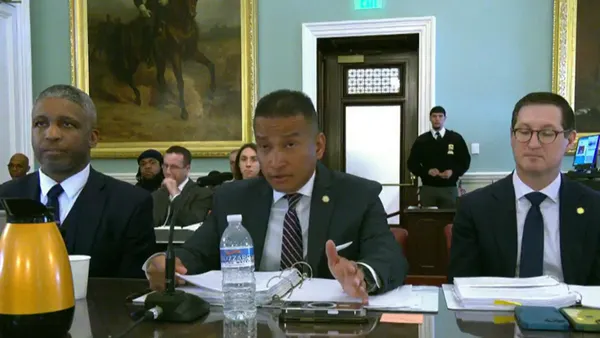UPDATE: Nov. 15, 2018: The St. Paul City Council voted 6-1 against allowing a petition to overturn the city's new franchise collection system to become a ballot referendum, as reported by the Twin Cities Pioneer-Press. St. Paul City Attorney Lyndsey Olson has said putting the contract's fate on a ballot would be unconstitutional and violate state statutes.
Opponents of the system have raised the possibility of a legal challenge, though no formal action has been taken yet. City officials plan to meet with franchise haulers in January to work out customer frustrations and some council members have already raised the possibility of either renegotiating or not renewing the initial five-year contract.
Dive Brief:
- A local activist last week submitted a new petition to overturn St. Paul, Minnesota's Ordinance 18-29, which created a system for organized trash collections in the city, as reported by The Twin Cities Pioneer Press. This follows the St. Paul City Council voting to repeal Ordinance 18-40, which deals with licensing haulers and other technical aspects of the program.
- With over 6,400 signatures on a petition to end the franchise system already submitted, city officials in St. Paul may be reconsidering their commitment. The organized collections system began on Oct. 1, and the petition was submitted too late to appear on the November ballot. It is yet unclear how supporters of the system and its opponents will grapple with the issue.
- One of the factors driving the push against the organized system is an aspect of the program that doesn't allow cart-sharing for buildings with under five units. This has increased costs for landlords who are moving the costs to their tenants, the Pioneer Press reported. The Star Tribune reports that out of 70,000 property owners covered by the new system, an estimated 9,300 weren't paying for service before.
Dive Insight:
Its long-term future may be uncertain, but for now the St. Paul system will remain. Many have said the repeal of Ordinance 18-40 won't be what ends it, since St. Paul Haulers LLC — a corporation formed by haulers to contract with the city — has already been licensed to operate. However, the council could vote to repeal it, rather than wait to put the petition up as a ballot initiative.
St. Paul Haulers LLC originally had 15 licensed haulers, but that number has shrunk to eight. The list still includes national names such as Waste Management, Republic Services and Advanced Disposal Services. Executives at some of these big companies have previously expressed their support for exclusive franchise collection systems, and it's easy to understand why. The deals are often for longer terms than standard contracts and contracting with a city or other municipality can be more efficient than negotiating contracts with individuals homes or businesses. Having rights to collect waste from certain streets or sections of a city can also make it easier to plan routes, which supporters has the added bonus of reducing emissions.
Such systems often have the consequence of raising rates for the new level of service being provided. This has become a major flashpoint in Los Angeles, after the city launched its own exclusive franchise system for commercial and multi-unit residential properties last year, and was one potential reason San Diego decided to keep its non-exclusive system in a recent vote. Similar questions are now being raised about pricing, as New York prepares to release its own non-exclusive franchise proposal this fall.
It can be a hard sell when local politicians have to tell their constituents that a service they may take for granted, such as waste collection, will get more expensive because of a city initiative. For city officials and staff looking to advocate for franchised collections, and for corporate operatives looking to take advantage of such systems, the potential fallout for those with legislative power is a critical part of the evaluation process.













